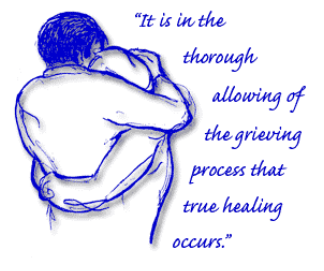
I will share some of the responses I’ve witnessed in the hope that those who are grieving may feel less alone, and those who wish to help may have an increased understanding of how to do so. Keep in mind that death not only affects people who knew the deceased, but may impact others who hear about a death. I have noticed that this type of reaction may actually offend people who were close to the deceased, as their reactions may be considered an insincere way to get attention or to feel connected to others. Although this is a possibility, vicarious trauma is a very real experience. Vicarious trauma can occur when you witness others who are suffering. It frequently occurs when people see images or hear vivid reports of death and dying on the news. When the deceased is only one person removed, vicarious trauma may be even stronger. In fact, my recent reaction to a colleague’s sudden loss surprised me. Although I did not know the person who died, I became very emotional and preoccupied upon hearing the news. I am still trying to make sense of this reaction.
Responses to death and dying often differ based on the circumstances. Although we have no control over whether someone dies quickly or not, it seems like people often have an opinion as to which type of death would be easier to handle. Some people wish that their loved one wouldn’t have died so suddenly, and others wish that the death of their friend or family member would’ve been less gradual. Initial reactions to sudden death are often shock and denial. People may feel a sense of being out of control when they suddenly realize how quickly life can be taken away from them while engaging in everyday routines. People may search for someone or something to blame so as to feel more in control over their own mortality. Losing someone quickly seems to evoke feelings of regret at not saying something or of having said or done something hurtful. Denial and disbelief are often present as our minds try to comprehend how someone could no longer exist when just moments before they were very much alive. With gradual death, the anticipation can be the most difficult piece. Some people feel a sense of guilt due to wishing the death would just happen already so that they can move on and return to a sense of normalcy. Since there is more time to interact with the person who is dying, there is sometimes pressure to say or do something extraordinary.
People have varying ways of grieving. Some have reported a strong desire to be alone, and others only want to be around those who knew the deceased. It may be helpful to reminisce about the positive experiences one had with the deceased. People may find it useful to process the details surrounding the death by replaying it over and over until it begins to make sense. Others need to distract themselves and then gradually explore their feelings when they begin to feel less overwhelmed. Some people are less distressed than they would have expected, and may feel a sense of guilt that they are not more impacted. Grief may cause a variety of behaviors and feelings including but not limited to anger, sadness, nightmares, insomnia, eating disturbances, isolation, substance abuse, and self-harm.
Regardless of the circumstances surrounding the death or the reactions people experience, it’s important to be patient and gentle with yourself and others who are grieving. I’ve learned that since everyone handles grief differently, it is helpful to ask how you can be supportive without assuming you know the right thing to say. I’ve heard that some people cannot stand when others say, “I’m sorry”. This statement may be interpreted as fake or may cause the griever to feel obligated to say, “It’s okay”,when it’s not. Across the board, I’ve heard that it is unhelpful to say “It will be okay” to someone experiencing a loss. Generally these statements are well-meaning, but they end up meeting the speaker’s needs more than the griever’s. It’s hard to know what to say and many people feel extremely uncomfortable dealing with the subject of death. So if you truly care about being helpful, let the griever know that you care about them and will try your best to support them in whatever way they need. Refer them to a professional if they are at risk for hurting themselves or others. Also, be aware that there is no right way of grieving and no appropriate time limit. I believe that it’s harmful to pathologize bereavement and/or try to create a formula for understanding grief. We are all different and loss is a very personal experience that doesn’t need to be labeled and/or judged.



 RSS Feed
RSS Feed